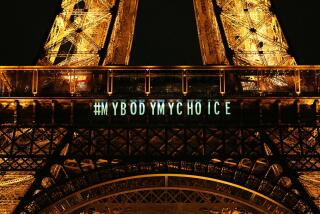French Parliament Clears Way for Vote on EC Treaty : Unity: A special session approves constitutional changes. The referendum on European integration may now be moved up.
- Share via
PARIS — As protesting farmers blocked roads leading to the French capital, a special joint session of the French Parliament on Tuesday overwhelmingly approved constitutional changes necessary to set up a critical national referendum that many feel will determine the fate of the movement for European political and economic union.
The French national vote on ratification of the treaty for European political and economic union, signed by the leaders of the 12 European Community members in December in the Dutch city of Maastricht, has been proposed for this fall. However, some observers feel that French President Francois Mitterrand will advance the date of the referendum to next month in order to take advantage of the momentum created during the debate for the constitutional changes approved Tuesday, including a hotly debated amendment allowing citizens of other EC countries who live in France to vote in French local elections.
With combined support from the governing Socialist Party and its traditional rival, the moderate right-wing Union for French Democracy party headed by former President Valery Giscard d’Estaing, the delegates to the Constitutional Congress, who met amid regal pomp at the Versailles Palace outside Paris, easily achieved the three-fifths majority necessary for approval. The final vote was 592 to 73.
However, stressing their opposition to the Maastricht Treaty, delegates from the neo-Gaullist Rally for the Republic party led by former Prime Minister Jacques Chirac walked out of the Versailles meeting before the vote was taken. The Maastricht accord is also opposed by the French Communist Party and the extreme right-wing National Front.
Socialist government leaders were ecstatic over the result, which enables Mitterrand to bring good news with him to a summit of European leaders set to begin Thursday in Lisbon. The lopsided show of French support for European union may also help save the job of EC President Jacques Delors, a French Socialist whose term at the helm of the European Commission is up for renewal in Lisbon.
“It was a success for Europe, a success for France and a setback for the opponents of European union,” said an ebullient Prime Minister Pierre Beregovoy after Tuesday’s parliamentary vote.
In referendums earlier this month, voters in Denmark narrowly rejected the Maastricht Treaty while Irish voters approved it.
However, the upcoming French referendum is widely viewed as the make-or-break test in the 40-year effort to forge a European union to rival the United States and Japan. Along with Germany, France is considered one of the twin pillars of the European union.
Without the enabling constitutional changes approved Tuesday, France would have been unable to participate in the proposed union of European states, which calls for each country to surrender some of its national sovereignty to a central EC government in the European capital of Brussels and some legislative authority to the European Parliament in Strasbourg, France.
Many steps toward the creation of a single European market have already been established by the EC members through previous agreements, including the elimination of border controls among the member states by the end of the year. But the most important of the Maastricht agreements, the creation of a single European currency and banking authority, is not set to take effect until 1999.
Polls show that a majority of French support the European proposals but indicate that the support has slipped steadily in recent weeks. Some of the internal divisions over the European accord were evident Tuesday as French farmers, protesting proposed European cuts in farm subsidies for their crops, attempted a blockade of the French capital by parking fleets of tractors on major roads leading into the city.
Although the farmers disrupted traffic on some roads, forcing police to counterattack with tear gas and bulldozers used to push the tractors off the roads, government officials described the attempted blockade as a failure. The farmers called off the effort in the evening.
More to Read
Sign up for Essential California
The most important California stories and recommendations in your inbox every morning.
You may occasionally receive promotional content from the Los Angeles Times.













